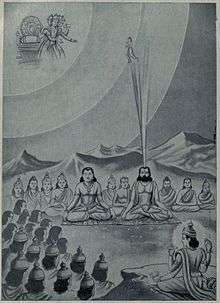Ikshvaku
In ancient India, Ikshvaku (Sanskrit; ikṣvāku, from Sanskrit ikṣu; Pali: Okkāka), one of the ten sons of Shraddhadeva Manu, was the first king of the Ikshvaku dynasty, known as the "Suryavansha", and the kingdom of Kosala in ancient India.[1] According to the Vishnu Purana, he had a hundred sons,[2] among whom the eldest was Vikukshi. Ikshvaku's another son, named Nimi, founded the Kingdom of the Videhas.[3] Lord Rama belonged to the Suryavansha or Ikshvaku dynasty.[4]
| Ikshvaku | |
|---|---|
 Chanting Brahmins and King Ikshvaku proceed to heaven | |
| Dynasty | Ikshvaku |
| Father | Vaivaswata Manu |
| Mother | Shraddha |
| Religion | Hinduism |
Origin
King Ikshvaku was the son of Satyavrata also called Shraddhadeva Manu, the king of Dravida kingdom.[5] According to the Vedas, Ikshvaku was the protector of the five territories of Panchajanah who were non-sacrificing pre-Aryan and non-Aryan people. The Atharvaveda and Brahmanas associate the Ikshvakus with the non-Aryan people, that is they are different from the Vedic Aryans who composed hymns of the four Vedas.[6][7] F. E. Pargiter has equated the Ikshvakus with the Dravidian peoples.[8]
In Bhagavatha Purana
Ikshvaku and his ancestor Manu are mentioned in the Bhagavata Purana (Canto 9, Chapter 1),
yo ’sau satyavrato nāma |
he who was known as Satyavrata |
See also
References
Citations
- Thapar 2013, p. 308-309.
- John Garrett (1975). A Classical Dictionary of India. New Delhi: Atlantic Publishers & Distri. p. 259. GGKEY:YTLNG1DG7JN. Retrieved 15 September 2017.
- Subodh Kapoor (2004). A Dictionary of Hinduism: Including Its Mythology, Religion, History, Literature, and Pantheon. New Delhi: Cosmo Publications. p. 171. ISBN 978-81-7755-874-6. Retrieved 15 September 2017.
- Peter Scharf. Ramopakhyana - The Story of Rama in the Mahabharata: A Sanskrit Independent-Study Reader. Routledge, 2014. p. 559.
- Jagdish Lal Shastri, Arnold Kunst. Ancient Indian Tradition & Mythology, Volume 9. Motilal Banarsidass, 1976. p. 1125.
- Indian History Congress. Proceedings of the Indian History Congress, Parts 1-2. pp. 32–33.
- Ram Chandra Jain. Ethnology of Ancient Bhārata. Chowkhamba Sanskrit Series Office, 1970. p. 18.
- Ram Chandra Jain. Ethnology of Ancient Bhārata. Chowkhamba Sanskrit Series Office, 1970. p. 21.
Sources
- Thapar, Romila (2013), The Past Before Us, Harvard University Press, ISBN 978-0-674-72651-2